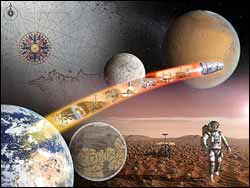Aurora participants approve preparatory phase for European Space Exploration Programme

ESA’s Aurora mission will explore the solar system
At the last meeting of the Aurora Board of Participants, held at ESA’s Paris headquarters on Thursday 8 July, the participating states approved the Preparatory Phase of the European Space Exploration Programme (ESEP).
Revising the original Declaration, the European countries already participating, plus Canada, unanimously agreed to remodel Aurora into a broader preparatory ESEP. This is with a view to possibly increasing their subscriptions and welcoming further participants, including the European Union, in accordance with the signed Framework Agreement.
This decision will ensure that industrial work carried out thus far under Aurora continues. It will enable the drafting of a long-term plan for a robust, innovative and flexible ESEP programme proposal and for a decision at the next ESA ministerial-level Council meeting in 2005. Concerning the financial envelope for this phase, participating states are to confirm their subscription levels by the end-September deadline.
This Preparatory Phase responds to the Director General’s call for new initiatives to build a European Space Programme. Alongside basic and utilitarian activities, the European Space Exploration Programme will provide the inspirational dimension to this. It is, however, also deeply rooted in the work done under Aurora since 2001.
The European Commission (EC), together with all ESA Member States not yet participating, attended the meetings that produced this positive result. They expressed a common interest in space exploration and in ESA’s proposal. The EC is expected to contribute to the Preparatory Phase, especially to scenario building and public outreach.
Pending the next ESA Ministerial Council, work on the main missions designed under Aurora will continue. Notably, the follow-on to the ExoMars Phase A industrial studies and the entry vehicle demonstrator. Mars sample return mission studies will continue and a technology development study on entry, descent and landing systems is also scheduled.
Media Contact
More Information:
http://www.esa.intAll latest news from the category: Physics and Astronomy
This area deals with the fundamental laws and building blocks of nature and how they interact, the properties and the behavior of matter, and research into space and time and their structures.
innovations-report provides in-depth reports and articles on subjects such as astrophysics, laser technologies, nuclear, quantum, particle and solid-state physics, nanotechnologies, planetary research and findings (Mars, Venus) and developments related to the Hubble Telescope.
Newest articles

Innovative 3D printed scaffolds offer new hope for bone healing
Researchers at the Institute for Bioengineering of Catalonia have developed novel 3D printed PLA-CaP scaffolds that promote blood vessel formation, ensuring better healing and regeneration of bone tissue. Bone is…

The surprising role of gut infection in Alzheimer’s disease
ASU- and Banner Alzheimer’s Institute-led study implicates link between a common virus and the disease, which travels from the gut to the brain and may be a target for antiviral…

Molecular gardening: New enzymes discovered for protein modification pruning
How deubiquitinases USP53 and USP54 cleave long polyubiquitin chains and how the former is linked to liver disease in children. Deubiquitinases (DUBs) are enzymes used by cells to trim protein…


